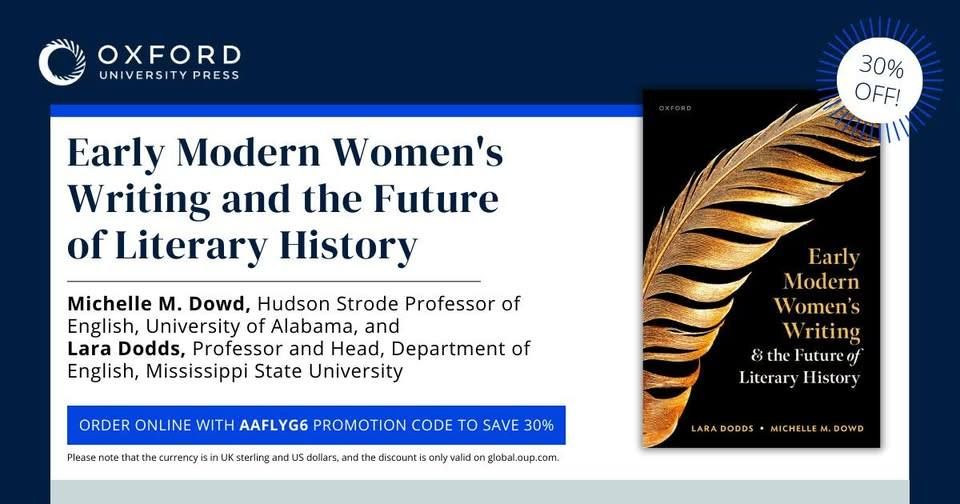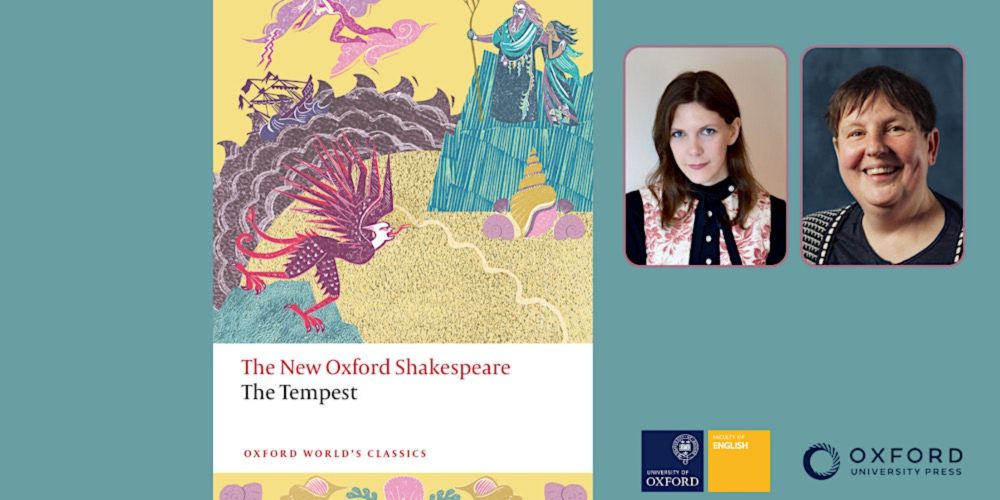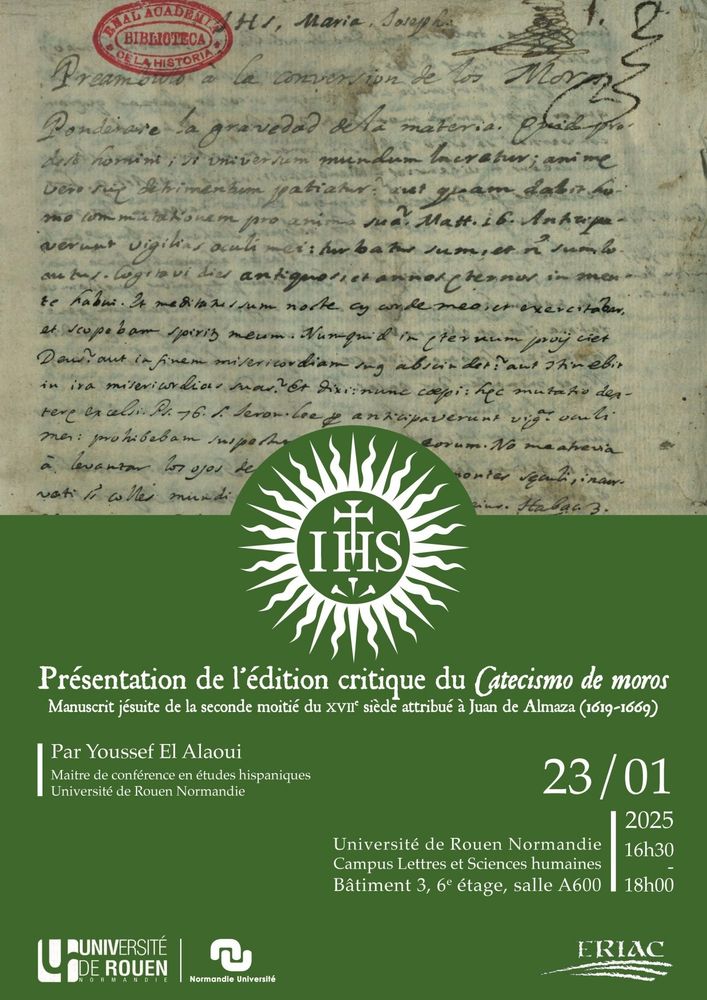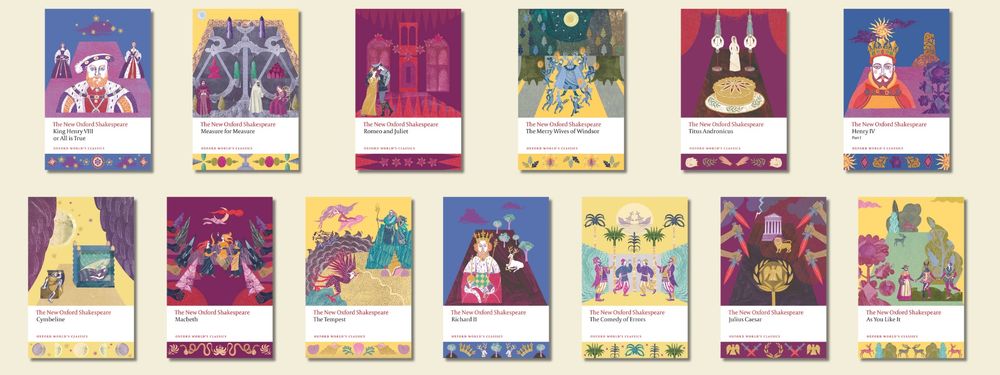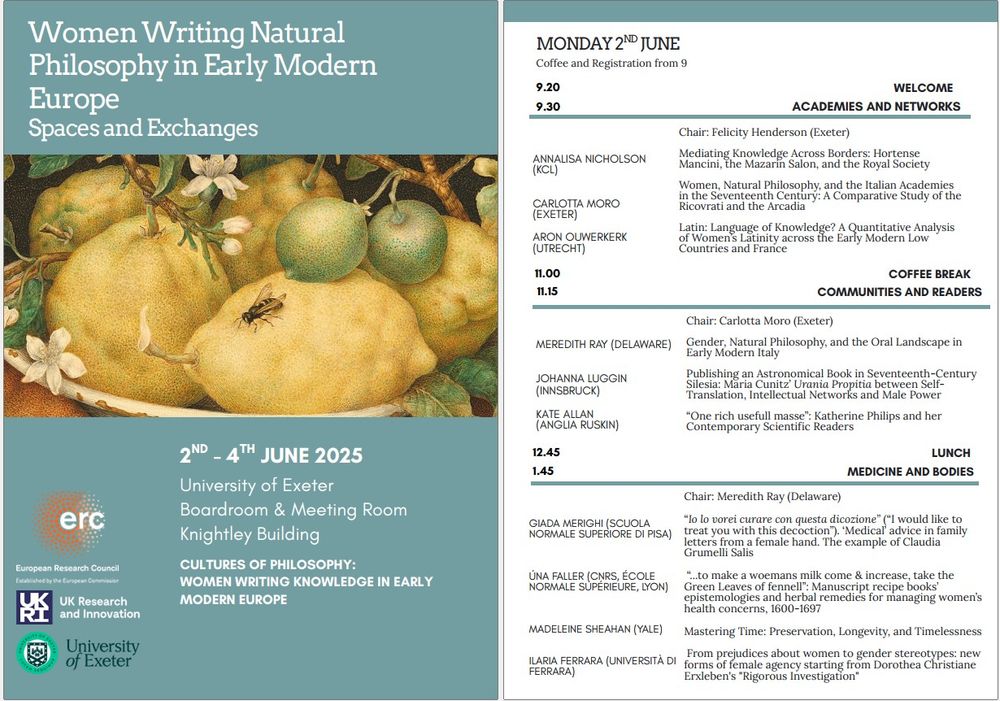
Women Writing Natural Philosophy in Early Modern Europe: Spaces and Exchanges University of Exeter, Knightley Building, 2-4 June MONDAY 2nd JUNE From 9.00 COFFEE AND REGISTRATION 9.25 WELCOME – CultPhil Team 9.30-11 ACADEMIES & NETWORKS Chair: Felicity Henderson (Exeter) Annalisa Nicholson (KCL), Mediating Knowledge Across Borders: Hortense Mancini, the Mazarin Salon, and the Royal Society Carlotta Moro (Exeter), Women, Natural Philosophy, and the Italian Academies in the Seventeenth Century: A Comparative Study of the Ricovrati and the Arcadia Aron Ouwerkerk (Utrecht), Latin: Language of Knowledge? A Quantitative Analysis of Women’s Latinity across the Early Modern Low Countries and France Coffee break 11.15-12.45 COMMUNITIES & READERS Chair: Carlotta Moro (Exeter) Meredith Ray (Delaware), Gender, Natural Philosophy, and the Oral Landscape in Early Modern Italy Johanna Luggin (Innsbruck), Publishing an Astronomical Book in Seventeenth-Century Silesia: Maria Cunitz’ Urania Propitia between Self-Translation, Intellectual Networks and Male Power Kate Allan (Anglia Ruskin), “One rich usefull masse”: Katherine Philips and her Contemporary Scientific Readers Lunch 1.45-3.45 MEDICINE & BODIES Chair: Meredith Ray (Delaware) Giada Merighi (Pisa), «Io lo vorei curare con questa dicozione» («I would like to treat you with this decoction»). ‘Medical’ advice in family letters from a female hand. The example of Claudia Grumelli Salis Úna Faller (CNRS, École Normale Supérieure, Lyon), “...to make a woemans milk come & increase, take the Green Leaves of fennell”: Manuscript recipe books’ epistemologies and herbal remedies for managing women’s health concerns, 1600-1697 Madeleine Sheahan (Yale), Mastering Time: Preservation, Longevity, and Timelessness Ilaria Ferrara (Ferrara), From prejudices about women to gender stereotypes: new forms of female agency starting from Dorothea Christiane Erxleben's "Rigorous Investigation"
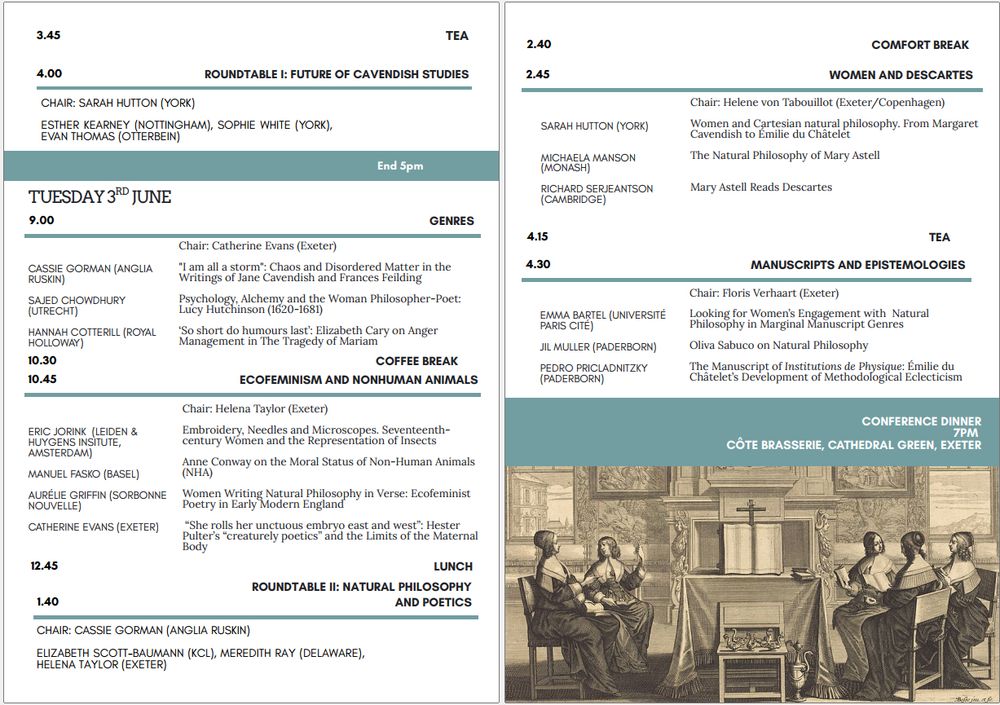
4-5.00 CAVENDISH ROUNDTABLE: Esther Kearney (Nottingham), Sophie White (York), Evan Thomas (Otterbein), Chair: Sarah Hutton (York) TUESDAY 3rd JUNE 9.00-10.30 GENRES Cassie Gorman (Anglia Ruskin), '"I am all a storm": Chaos and Disordered Matter in the Writings of Jane Cavendish and Frances Feilding Sajed Chowdhury (Utrecht), Psychology, Alchemy and the Woman Philosopher-Poet: Lucy Hutchinson (1620-1681) Hannah Cotterill (Royal Holloway), ‘So short do humours last’: Elizabeth Cary on Anger Management in The Tragedy of Mariam Coffee 10.45-12.45 ECOFEMINISM & NONHUMAN ANIMALS Eric Jorink (Leiden & Huygens Insitute, Amsterdam), Embroidery, Needles and Microscopes. Seventeenth-century Women and the Representation of Insects Manuel Fasko (Basel), Anne Conway on the Moral Status of Non-Human Animals (NHA) Aurélie Griffin (Sorbonne Nouvelle), Women Writing Natural Philosophy in Verse: Ecofeminist Poetry in Early Modern England Catherine Evans (Exeter), “She rolls her unctuous embryo east and west”: Hester Pulter’s “creaturely poetics” and the Limits of the Maternal Body Lunch 1.40-2.40 ROUNDTABLE 2: NATURAL PHILOSOPHY & POETICS Elizabeth Scott-Baumann (KCL); Meredith Ray (Delaware); Helena Taylor (Exeter), Chair: Cassie Gorman (ARU) Comfort Break 2.45-4.15 WOMEN AND DESCARTES Sarah Hutton (York), Women and Cartesian natural philosophy. From Margaret Cavendish to Émilie du Châtelet Michaela Manson (Monash), The Natural Philosophy of Mary Astell Richard Serjeantson (Cambridge), Mary Astell Reads Descartes Tea 4.30-6.00 MANUSCRIPTS & EPISTEMOLOGIES Emma Bartel (Université Paris Cité), Looking for Women’s Engagement with Natural Philosophy in Marginal Manuscript Genres Jil Muller (Paderborn), Oliva Sabuco on Natural Philosophy Pedro Pricladnitzky (Paderborn), The Manuscript of Institutions de Physique: Émilie du Châtelet’s Development of Methodological Eclecticism CONFERENCE DINNER 7pm Côte Brasserie
![WED 4th JUNE
9.30-11 METHODS
Chair: Eric Jorink (Leiden)
Kirsten Walsh (Exeter), Action at a Distance—Reflections on the History of Women in Science
Peter West (Northeastern University London), “A Scientific Association”: New Digital Methods for Understanding the Impacts of Early Women Writers on the Development of Science and Philosophy
Marina Aguilar (Universidad Nacional de Educación a Distancia (UNED), Tratado Philosóphico-poético escótico by María de Camporredondo as an example of Hispanic Women Thinker from the Modern Age
Coffee
11.15-12.45 RECEPTION, AUTHORSHIP, and POPULARISATION
Chair: Bodil Hvass Kjems (Copenhagen)
Arianne Margolin (Independent), Jeanne Dumée’s Plurality of Worlds: The Feminine Voice and the Emergence of the Fiction Scientifique
Aretina Bellizzi (Ghent), From a New Readership to a New Authorship. Vernacular Plato and the Female Audience in Early Modern Italy
Floris Verhaart (Exeter), The Doctor, the Theologian, and the Translator: Medicine and Divine Providence in the Writings of Johan van Beverwijck, Anna Maria van Schurman, and Johanna Dorothea Lindenaer
CLOSE AND LUNCH
This conference is supported by the European Research Council-selected Starting Grant, ‘Cultures of Philosophy: Women Writing Knowledge in Early Modern Europe’, funded by UK Research and Innovation (UKRI), under the UK government’s Horizon Europe funding guarantee [grant number EP/Y006372/1].](https://cdn.bsky.app/img/feed_thumbnail/plain/did:plc:peyr652ptzk3m4gf3dgs4gmk/bafkreihuop4aupg2mp34d6apimeredvytwqabfll73i3g5ynem2eahujju@jpeg)
WED 4th JUNE 9.30-11 METHODS Chair: Eric Jorink (Leiden) Kirsten Walsh (Exeter), Action at a Distance—Reflections on the History of Women in Science Peter West (Northeastern University London), “A Scientific Association”: New Digital Methods for Understanding the Impacts of Early Women Writers on the Development of Science and Philosophy Marina Aguilar (Universidad Nacional de Educación a Distancia (UNED), Tratado Philosóphico-poético escótico by María de Camporredondo as an example of Hispanic Women Thinker from the Modern Age Coffee 11.15-12.45 RECEPTION, AUTHORSHIP, and POPULARISATION Chair: Bodil Hvass Kjems (Copenhagen) Arianne Margolin (Independent), Jeanne Dumée’s Plurality of Worlds: The Feminine Voice and the Emergence of the Fiction Scientifique Aretina Bellizzi (Ghent), From a New Readership to a New Authorship. Vernacular Plato and the Female Audience in Early Modern Italy Floris Verhaart (Exeter), The Doctor, the Theologian, and the Translator: Medicine and Divine Providence in the Writings of Johan van Beverwijck, Anna Maria van Schurman, and Johanna Dorothea Lindenaer CLOSE AND LUNCH This conference is supported by the European Research Council-selected Starting Grant, ‘Cultures of Philosophy: Women Writing Knowledge in Early Modern Europe’, funded by UK Research and Innovation (UKRI), under the UK government’s Horizon Europe funding guarantee [grant number EP/Y006372/1].
We are delighted to announce the program for our summer conference: Women Writing Philosophy in Early Modern Europe: Spaces and Exchanges, to be held in Exeter 2-4 June
22.04.2025 14:25 — 👍 10 🔁 9 💬 1 📌 3
